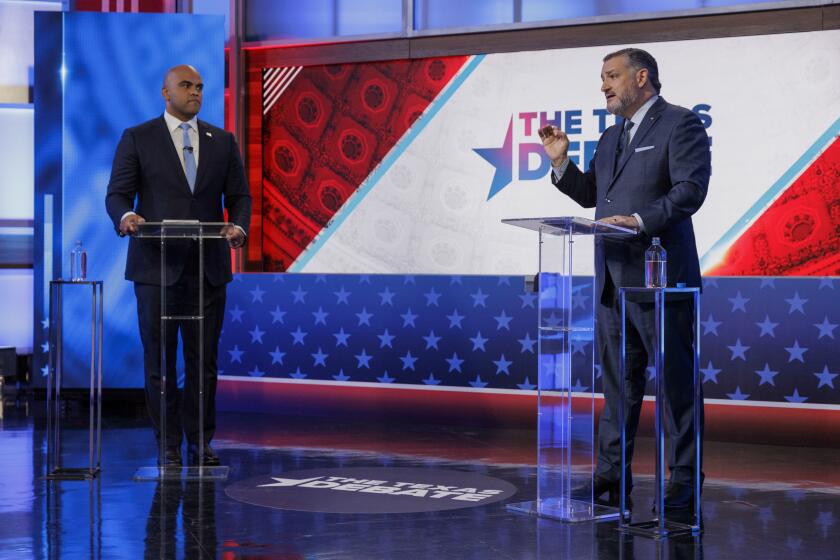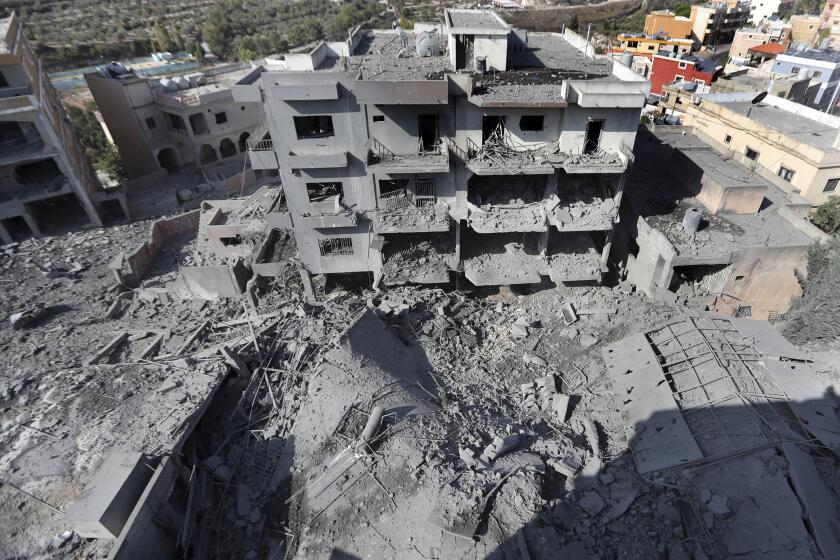Pakistan Sends Mixed Signals on Arms Tests
President Clinton made a last-ditch appeal to Pakistan on Sunday to resist growing pressures to carry out a nuclear test, amid conflicting signals about whether the government of Prime Minister Nawaz Sharif had already made its decision.
Foreign Minister Gohar Ayub Khan said Sunday that Pakistan will test its own nuclear device in response to India’s two rounds of nuclear tests last week. “It’s a matter of when, not if, Pakistan will test. The decision has already been taken by the Cabinet,” he told Associated Press.
But U.S. officials disputed whether a final decision had yet been made. Khan has strong ties with the military and has taken a hard line in public before, they noted. And Sharif’s government told a high-powered U.S. diplomatic team as recently as Friday that Pakistan was in no hurry to conduct tests.
After acknowledging the “tremendous popular pressure” favoring a test, Pakistani Information Minister Mushahid Hussain said on CBS-TV’s “Face the Nation” on Sunday that the government in Islamabad had not made any definitive decision.
In Birmingham, England, Clinton called on Pakistan to “find the strength necessary to walk away from a test.”
But the senior U.S. envoy dispatched to persuade Pakistan conceded Sunday that there are no “magic wands” that would influence Islamabad to hold off.
“They certainly didn’t convey to us a wish list of things that, if we did them, they would then not test,” Deputy Secretary of State Strobe Talbott said Sunday after briefing Clinton on talks Friday with the Pakistani government.
Pakistan has appeared to be acting, in part, out of disappointment with the international response to India’s behavior. Sharif expressed frustration Sunday at that “weak-kneed” reaction and at conspicuous divisions among the leaders at the weekend summit in Birmingham of the world’s foremost industrialized nations, the Group of 8.
“If the international community does not take action against India, then we will be forced to test the deterrent, and no one can stop us from doing so,” Sharif said.
He also disclosed that Pakistan needs only 12 hours to explode a nuclear device. “We will be forced to test . . . and no one can stop us from doing so,” he told reporters outside his home in the northeastern city of Lahore.
So far, only the United States, Canada and Japan have imposed sanctions on India, while Europe’s response has been limited to verbal condemnation. “It’s clear there is no price tag for bad behavior,” Hussain, the information minister, said later on Cable News Network’s “Late Edition.”
In an eleventh-hour appeal to Pakistan to hold off a test that could trigger other actions in the volatile region, a resounding chorus of senior congressional and administration officials said Sunday that it would be willing to consider lifting restrictions on Pakistan and offering other inducements for its cooperation.
“If they take this positive step and not test, then the U.S. is willing to look at ways to help them,” U.N. Ambassador Bill Richardson said on ABC-TV’s “This Week With Sam Donaldson and Cokie Roberts.”
Sens. Richard C. Shelby (R-Ala.) and Bob Kerrey (D-Neb.), who are chairman and vice chairman of the Senate Select Committee on Intelligence, both said Sunday on NBC-TV’s “Meet the Press” that they favor letting Pakistan take delivery of 28 F-16 fighter planes held by the United States.
Shipment of the warplanes has been blocked since 1990 by a congressional action designed to prevent Pakistan from developing nuclear weaponry.
If Pakistan demonstrated restraint, National Security Advisor Samuel R. “Sandy” Berger predicted, the sentiment in Congress about U.S. relations with Pakistan would change “dramatically” and a “lot of restrictions” would be “rolled back.”
But U.S. pledges have limited clout as Pakistan makes its final calculations because of the record of previous American promises, according to U.S. experts.
Highest on the list was a pledge by Clinton made in 1995 to former Prime Minister Benazir Bhutto to sort out the long-standing problem of the F-16s, for which Pakistan paid more than half a billion dollars. The White House said Pakistan was due either the money or the planes, but nothing happened.
“When the United States says to Pakistan that things can change between our two countries if it shows restraint, Prime Minister Sharif and those around him look at the costs of restraint over the past 10 years from their point of view,” said Michael Krepon, president of the Henry L. Stimson Center, a think tank.
“On that basis, it’s going to be real hard for the Pakistanis not to follow the Indians.”
Sharif is in a lose-lose position as he is challenged by conflicting pressures at home and from the outside world, experts said.
If his government follows through on a nuclear test, Pakistan faces almost automatic U.S. sanctions, which would have a far tougher impact on the predominantly Muslim state than on India.
“It is very likely to go into default on its international loans because of sanctions. And then the country’s centrifugal forces--religious, ethnic and sectarian--are bound to grow,” Krepon said.
If, however, it opts not to test, the government may be seen as a lackey of the United States and international financial institutions. “That means the politics of the street are likely to create enormous instability for the government, beginning with asking for its head,” Krepon added.
Khan claimed that Pakistan’s position had hardened since the U.S. team left Saturday. “We have taken in view everything and discussed what it will cost us, and we will go ahead,” he told AP.
More to Read
Sign up for Essential California
The most important California stories and recommendations in your inbox every morning.
You may occasionally receive promotional content from the Los Angeles Times.










